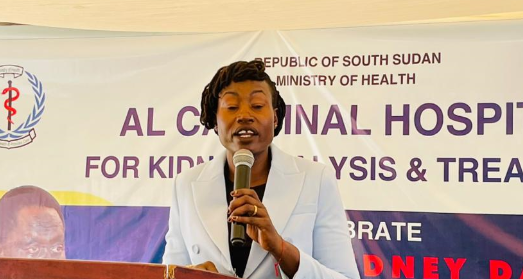South Sudan marked World Kidney Day at the Al-Cardinal Hospital for Kidney Dialysis and Treatment in Juba on Thursday.
Speaking at the function, National Health Minister Yolanda Auel Deng acknowledged that the responsibility for the treatment of kidney and heart diseases lies with the government.
She stressed that her ministry is working hard to develop and rehabilitate hospitals in Juba and the states and appreciated the role of doctors at Al-Cardinal Hospital for Kidney Dialysis and Treatment despite working in challenging conditions.
“Doctors work under very difficult conditions,” she said. “South Sudan does not suffer from a shortage of medical personnel. Doctors are available, but perhaps poor wages are the reason behind most doctors leaving the country.”
For his part, Ader Machar Achiek, the undersecretary at the National Health Ministry, said that kidney-related diseases killed more than 3 million people in 2019 globally.
“Today is not only a celebration, but we are working to reduce the incidents of kidney disease in the country,” he stated.
Meanwhile, Abdullah Sabeel, a nephrology specialist at Al-Cardinal Hospital for Kidney Dialysis and Treatment, called for the formation of a nephrology association at the level of the states. He said the health ministry has another responsibility of handling HIV/AIDS, cholera, and other diseases.
“A nephrology association must be formed at the state level to support kidney diseases,” he said. “The future of Al-Cardinal Hospital for Kidney Dialysis and Treatment will be bright, thanks to the efforts of southern doctors.”
Largor Daniel Fout, one of the people diagnosed with kidney cancer and who came to Juba recently from Khartoum, said he used to undergo dialysis three times in Sudan but now does it twice in Juba due to difficult living conditions.
He pointed out that the first dialysis at a hospital in South Sudan cost him around USD 200.




